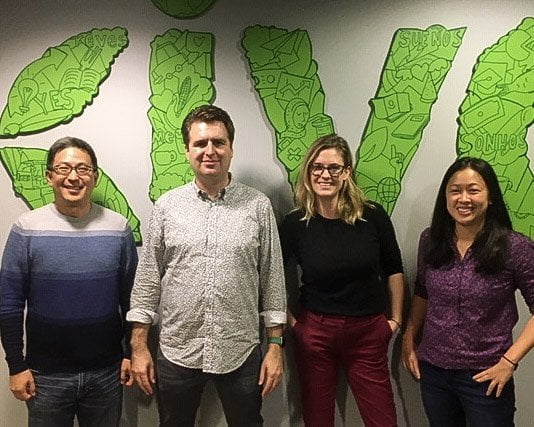Better Than Most is a regular feature of The Business of Giving, examining the best places to work among social good businesses and nonprofit organizations.
Denver: For this edition, we’ll be going to Howard Street in San Francisco and to the headquarters of Kiva, an organization that envisions a financially inclusive world where all people hold the power to improve their lives. We’ll start with their CEO, Neville Crawley, and then we’ll hear from some of the other members of the team.
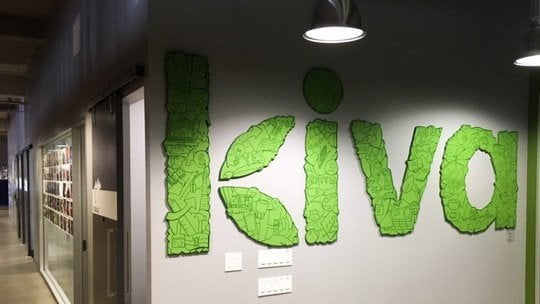
Neville: One of the most impactful and important things we can do is get employees to meet with end borrowers; also meet with lenders, but meet with end borrowers because that’s where we really have an impact in the world. It can be meeting a single, working mom in Cambodia. It can be meeting a small business owner in California. It can be meeting a bicycle repairman in Kenya. It can be meeting any of the many millions of people that we serve at Kiva. But that’s when the impact — all of the work that we do, whether it’s writing computer code or whether it’s doing client service — that’s when it all comes together.
And so, one of the things that we’ve introduced is that within the first year, every single employee who joins Kiva will get out to meet an end borrower in our end market. I think that really just brings us together around what’s the true impact we’re trying to have in the world and, therefore, why do we all do our individual jobs every day.
Tess: I had ridden down a dirt road for seven hours to meet a borrower in Zimbabwe, and I had a list and picture of all the lenders who had lent to this borrower from around the world – from Belgium to Brazil to Canada. After seven hours down this dirt road, I met the borrower in her shop, and I showed her the list of these lenders and her eyes just kind of welled with tears. She couldn’t believe that people around the world had taken a chance on her, believed in her business, and combined all their money to lend to her. This really inspired her to tell me about her next business plan. In addition to that, she also told me that through this business loan, she wasn’t only able to improve her business and expand it, she also started adopting children in the village who had been orphaned by HIV.
Goldie: I think there’s just a lot of interesting things going on at which we sit at the intersection. And by that, I mean, we’re a financial organization. We’re an organization providing financial opportunity and access to the bottom of the pyramid. We’re also a technology company. We are also an international development organization in 80-plus countries across the world. We’re also an organization that partners with corporates and foundations to kind of nudge ahead in the sector.
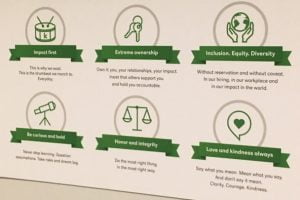
Kiva Core Values
Tess: Our Kiva values are also printed out in every conference room. They are front and center on our Slack channels. They are kind of just reminders to everyone in each project we work on. So they are: impact first; extreme ownership; inclusion, equity, diversity; be curious and bold; honor and integrity; and love and kindness always.
Ken: I spent most of my energy actually hiring about 28 people here. I have about half the organization that basically have dramatically changed over the years, and that’s the engineering team. And I think what we’ve really strived for is… I want to use the word diversity, but it’s not about diversity as your traditional expression. It’s really about diversity in thought and skill, and I think that was what’s needed for Kiva was basically adding more — for me, it was more than just technical firepower to the organization. It was more about adding things that we need to modernize Kiva whereas we need people with technical skills that are deeply skilled in front-end or user interface. We need people that were deeply skilled in cloud computing microservices. We need people that were deeply skilled in data science.
Neville: Of all of the values, my favorite value, or perhaps I could say the one I reflect on most, is about honor and integrity, which we talk about as “do the most right thing in the most right way.”
This is really important to Kiva because we operate in a world that’s complex. We operate in 80 different countries. We are a nonprofit so, of course, we take in donations, which are very, very important to allow us to have the impact in the world. At the same time, we’re a technology company and we have a lot of expenses. So, we often have a competition between what we’re ultimately optimizing for is impact in the world, is the end borrowers, is lives that we touch. But at the same time, bringing in revenue allows us to build new features, to take in more money, to ultimately impact more lives in the world. So, we kind of constantly walk the line between immediate impact and impact of scale. So, I think of that, [about] kind of honor and integrity is [how] that we think about that.
Austin: Doing the most right thing the most right way because especially in the legal function, you end up facing questions around what are we permitted to do just to make sure everyone has the same kind of context and then really engaging in open conversation on: Yes, we’re able to do that. But the question is, should we do that? And then how do you make those calculations, especially when you’re in a context of 80 different countries.
So where, for example, in some places, women’s rights may be different than other places. And if Kiva as an organization is focused on women’s empowerment, how do we navigate some of those – whether it’s cultural, religious, legal – kind of differences in countries without coming in with too big of a footprint, in a way where we also don’t compromise our values? And so, how do we kind of think about that in terms of the way that we work in countries and with borrowers?
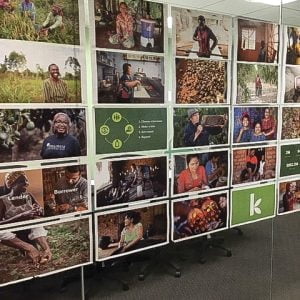 Ken: I think a few of us mentioned earlier that we really have really bold aspirations, like three impact lines, the impact that we want to make, the changes that we’re endeavoring to makes in the world. I think without the value of extreme ownership, I don’t think from an execution perspective, we can do the things we want to do.
Ken: I think a few of us mentioned earlier that we really have really bold aspirations, like three impact lines, the impact that we want to make, the changes that we’re endeavoring to makes in the world. I think without the value of extreme ownership, I don’t think from an execution perspective, we can do the things we want to do.
because these goals that we set forth of like one-year plan, three-year plan, five-year plan are extremely bold, which is another one of our values. And without the empowerment that, that we grant our staff, it’s really hard to achieve.
So for me, I think extreme ownership is just a really strong value.
Goldie: So with the culture piece and the values piece, it’s also worth mentioning that this is also incorporated into our performance discussions, our performance management discussions. As we think about every project, every investment, and every individual and team performance, it’s really a way to be accountable and to have that conversation where if something is really not in the spirit of the values, we’re either hypocrites or we’re going to talk through it until we kind of make sure we’re aligned. So that I really like, and I think that is actually how our values is, is how we use them. I think we’re still evolving through them. I wouldn’t say we’re perfect on any of these, but we’re always very mindful of them and having that be open conversation, which I think is a good first step and kind of above and beyond what… A lot of times you just have values and they’re just there, but I do believe there is a very authentic push from all levels of the organization to use them as an aligning tool on how we care about how we do things.
Neville: One of the most important things for me about communications at Kiva is basically having the same conversation at every level in the same way. So the conversation that I have with the board in tone, in substance, is really materially the same conversation that I have with the management team, that I have with individual employers. One is it’s just too much cognitive burden for me to try and have three different conversations, but also it just doesn’t serve anyone.
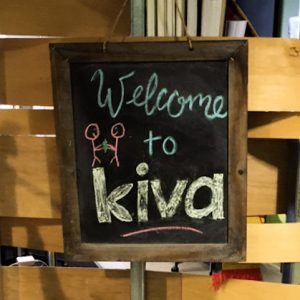 Austin: The work in the mission is really critical, and you don’t want either the organization or the new individuals kind of stumbling out of the gates. And so, I think we were developing a pretty good cadence now where when an employee comes in, both their kind of equipment is ready as well as each department is ready to go to give kind of an introductory session to the new employees coming on board. So, they understand what everyone’s function is, how we can work cross-functionally and collaboratively among the different departments – whether you’re an engineer coming in, why it’s important to understand what marketing and legal are worried about. Or if you’re a finance person, why you should actually pay attention on Fridays when we have weekly meetings in terms of what the new release is going to be like. And so, I think we up a good cadence there, which is really nice.
Austin: The work in the mission is really critical, and you don’t want either the organization or the new individuals kind of stumbling out of the gates. And so, I think we were developing a pretty good cadence now where when an employee comes in, both their kind of equipment is ready as well as each department is ready to go to give kind of an introductory session to the new employees coming on board. So, they understand what everyone’s function is, how we can work cross-functionally and collaboratively among the different departments – whether you’re an engineer coming in, why it’s important to understand what marketing and legal are worried about. Or if you’re a finance person, why you should actually pay attention on Fridays when we have weekly meetings in terms of what the new release is going to be like. And so, I think we up a good cadence there, which is really nice.
Tess: As you can see, it’s an open office space, so that helps with collaboration and grabbing people and asking them questions. We’re dog-friendly, so you’ll see dogs running around the office. We’re a little bit more relaxed in our dress; we’re business casual. We also do themed dress days. So, we have Fancy Fridays where people come in outrageous, formal attire. We had a Camou day. We have different themed dress days as well. So, it’s a really fun work environment that helps balance some of the more stressful things that you would have to do at work during the week.
Goldie: In talking about perks and benefits, which I like and think are important, and I think we do a very good job in trying to think about how to be creative and really bring value there. I think we’re also always looking at the benefits to think about how we can update them to match what our employees value.
I think Kiva has spent a good amount of time in the last few years bringing in external consultants or experts to do pay band analysis, to do equity analysis across demographic groups, to update salary bands, and to be transparent about different salary bands. So we’re very clear about what we pay and why we pay what we pay. I do believe we comp above social sector and in many cases, we are at market, which is very surprising for the sector, but is important, of course, not only for culture and people being valued and people being able to have high qualities of life, but really it’s just what’s competitive and what’s actually good for the business as well.

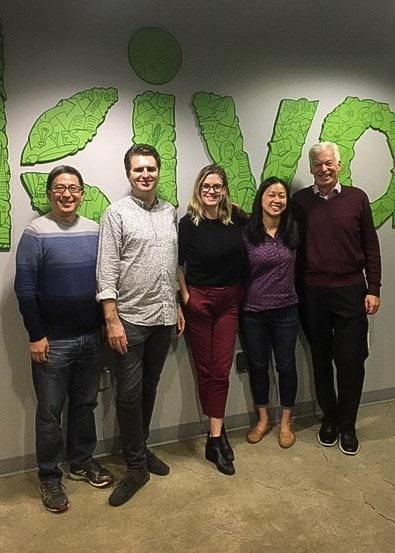
The team of Kiva and Denver Frederick
Denver: I want to thank all those who participated in this piece: Tess Murphy, Austin Choi, Goldie Chow, Ken Leung, and Neville Crawley. To hear this again, read the transcript, and see pictures of the participants and the Kiva offices, just visit denver-frederick.com.
The Business of Giving can be heard every Sunday evening between 6:00 p.m. and 7:00 p.m. Eastern on AM 970 The Answer in New York and on iHeartRadio. You can follow us @bizofgive on Twitter, @bizofgive on Instagram and at http://www.facebook.com/BusinessOfGiving

